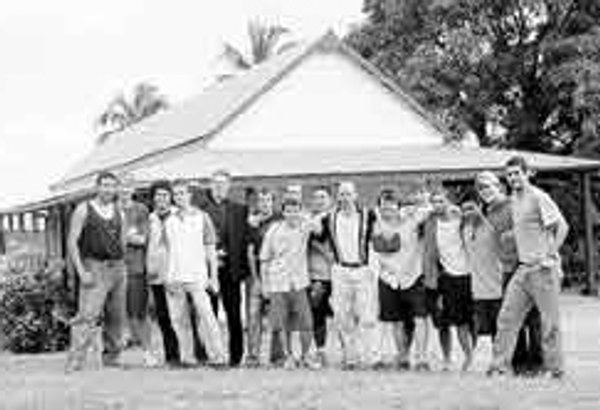When you tell friends that you spent your winter holidays in Vanuatu on a “workcamp” helping to renovate a building for the homeless, they are not necessarily convinced that you were altogether motivated by generosity.
“Vanuatu?” is the common response. “That’s beaches, palm trees, luxurious resorts, cruise ships …”
Vanuatu was all that. Indeed, from the roof of our worksite one could capture a beautiful panoramic glimpse of Port Vila (Vanuatu’s capital), its harbour, and the lush Iririki Island resort.
But I think for those of us who took part in the workcamp, the most satisfying pictures taken were the before and after shots of the run-down house we spent two weeks transforming into a well presented drop-in centre for the homeless of Port Vila.
We would agree that it was no episode of Our House; there were no fountains of endless supplies, no effortless feats of construction, in short, no 24-hour miracles.
Rather we experienced shortages of paint; disputes over putty, colours and working hours; and crises of leadership. I think we enjoyed it.
One problem for students is that we too often slip into our enforced holidays with only a hazy perception of the weeks to come, and commonly we emerge from the haze before anything has had a chance to solidify.
The inevitable inquisition “what did you do in the holidays?” can often leave you racking your brain afterwards “well, what did I do?”
Besides preventing any chance of a recurrence of this short-term amnesia, the workcamp to Vanuatu provided all the participants with an experience for which we will always be grateful.
We weren’t “professional volunteers” and we didn’t travel under the recognised banners of the Red Cross or Amnesty International.
Rather the 18 unskilled volunteers I travelled with included students from Adelaide, Melbourne, Sydney and rural NSW.
The trip was organised by Warrane College, a residential college at the University of NSW, and our project relied on personal contacts, minor sponsorships and the individual funds of the participants.
The makeshift nature of our trip was compensated by the fact that Warrane has 15 years of experience organising workcamps for its residents and people outside college.
It has undertaken projects throughout the South Pacific and in remote areas of Australia.
Participants pay money to work in their holidays and there’s no certificate at the end. So what’s the attraction?
I am sure the success of these workcamps lies in the innate and unique satisfaction that comes with a giving that is, theoretically, unremitted. I say theoretically because the real benefits for the volunteer, both tangible and less so, are plentiful and wide-ranging.
Most immediately in Vanuatu we experienced the tremendous hospitality of the local community, which provided for our basic needs - food and accommodation - and often went beyond these essentials, especially in the provision of food.
At a deeper level this hospitality reflected a deeper gratitude that probably meant most to the volunteers.
We also experienced travel and cultural immersion in a way that would be almost impossible to emulate from a cruise ship or a fronded resort.
The realities we experienced were far from our island paradise expectations, but the experience was all the better for that fact.
We could not have antiipated fresh French bread every breakfast, robust soccer matches with locals, watching cruise ships come and leave from a dark kava bar and learning the local handshake along with scraps of French and Bislama from kids who were trilingual at age 10.
But that’s what we encountered and I’m sure Alain de Botton would approve.
Besides these things, there are, of course, the tremendous friendships formed with fellow volunteers that seem to only be enhanced by a bitter argument over the appropriate grain of sandpaper or the prospect of rain.
Commonality of experience, especially such an exotic and unpredictable experience, is, I think, what secured these bonds for me and for the 18 volunteers with whom I travelled. It’s not a bad use of two weeks.
